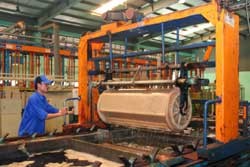 |
| A worker checks a zinc-plating production line at the Mechanical Tools for Export Joint Stock Company in Ha Noi. - VNA/VNS Photo |
(VOVworld) – Every year, Vietnam imports equipment of various kinds worth about 20 billion USD, much of which could be manufactured domestically. To remedy the situation, Vietnam’s mechanical engineering industry is speeding up an investment strategy aimed at making Vietnam an industrialized nation by 2020. VoV reporter To Tuan has more….
Vietnam has about 3,100 mechanical engineering businesses, 450 of them are state-owned and 156 private companies. The remainder is small-scale manufacturers. Most mechanical engineering companies are located in major cities such as Hanoi, Ho Chi Minh City, and Hai Phong. Half of all mechanical engineers specialize in manufacturing and assembling, while the rest are mainly repair shops. Since 2002, Vietnam had outlined a strategy to develop the sector with a target of gradual increase of the ratio of domestic materials in automobile assembly plants and reach a growth rate of 50% by 2010. But this level was never reached. This is attributed to many enterprises not spending an appropriate level of investment on new technologies.
In recent years, the Government has drawn up a series of policies to help domestic engineering businesses, with a special focus on supporting industries to manufacture parts. The Quang Trung Factory in Ninh Binh province, which used to lead the country in this sector and manufactured 13 types of products to replace imports have been in financial hardship for the last 2 years. Hundreds of tons of its products are still in stock waiting for a buyer. Nguyen Tang Cuong, the company’s Director, said that while it’s waiting for more support from the Government, the company’s leaders are trying to look for new markets. He comments ‘We feel insecure about the development of the domestic market, so we’ve thought of trying to export our products first’.
With the current economic slump, many companies have chosen to sub-contract for overseas partners, as a way of enhancing cooperation and raising standards. Nguyen Van Thu, Chairman of the Vietnamese Association of Mechanical Industries, says ‘In the last five years, many companies have enjoyed a growth rate of 20 to 25%. Despite the domestic and global economic difficulties, many enterprises have invested millions of USD in new equipment and assembly lines so they can bid for contracts to manufacture precise mechanical products for overseas. Several investors abroad have shown their belief in products that are made-in-Vietnam, by transferring their plant and technology to Vietnamese companies and then making orders with their new Vietnamese partners’.
To help companies out, the Government has worked out preferential policies for loans, and assistance for new private engineering businesses to develop. Do Huu Hao, the former Deputy Minister of Industry and Trade, says ‘The appointment of contractors in special cases regulated in the Prime Minister’s policy, is considered extremely successful. For instance, the appointment of contractors for some key projects, such as the Son La Hydro-Electric Power Station, which helped many domestic mechanical engineering companies whose sources of capital and technology are still limited’.
In the near future, priority will be given to developing key mechanical products to meet the economy’s basic requirements. These include engineering equipment for agriculture; machine tools; construction engineering; shipbuilding; electrical and electronic equipment; automobiles, communications and the transport sector. In addition to prioritizing bank loans, the Government plans to increase the ratio of parts and materials produced domestically.
To Tuan